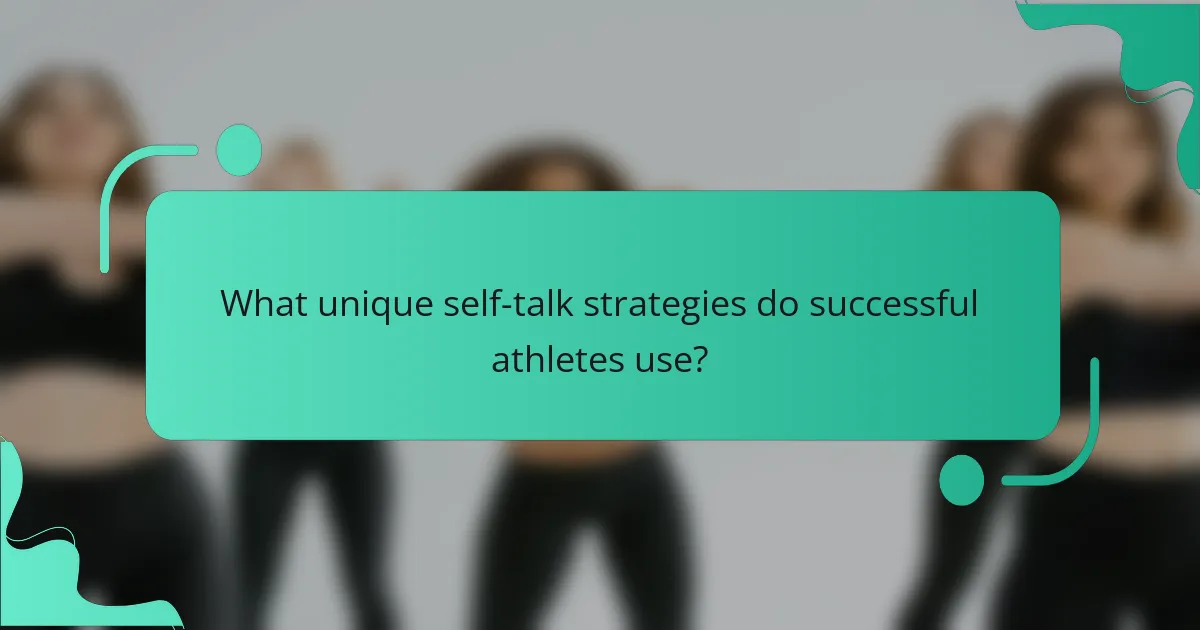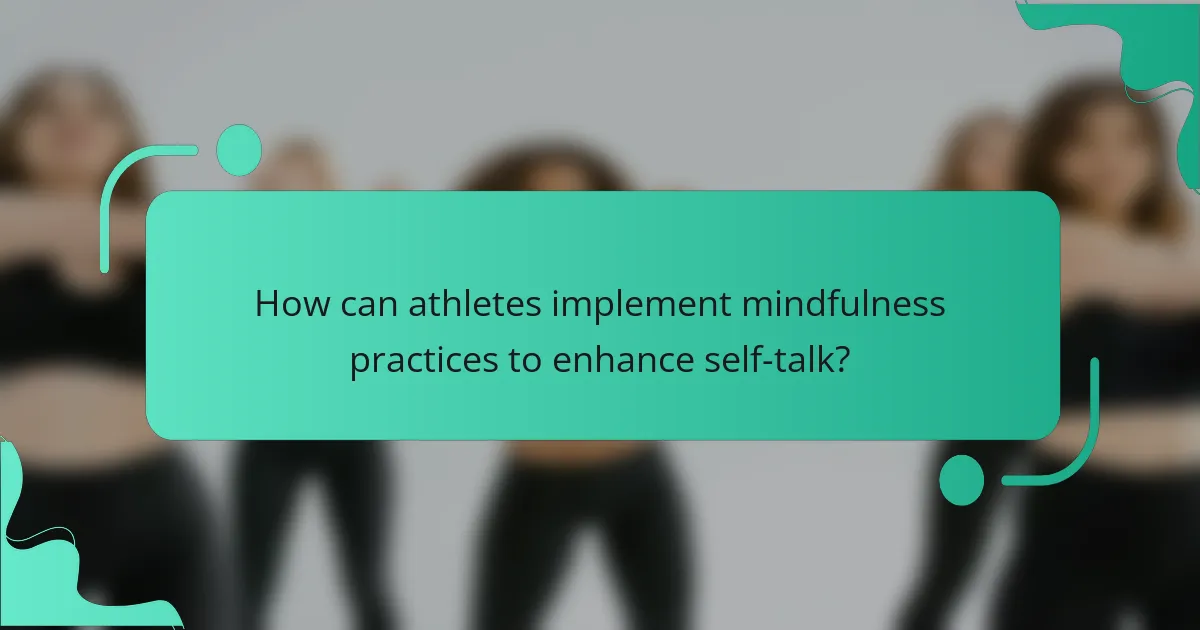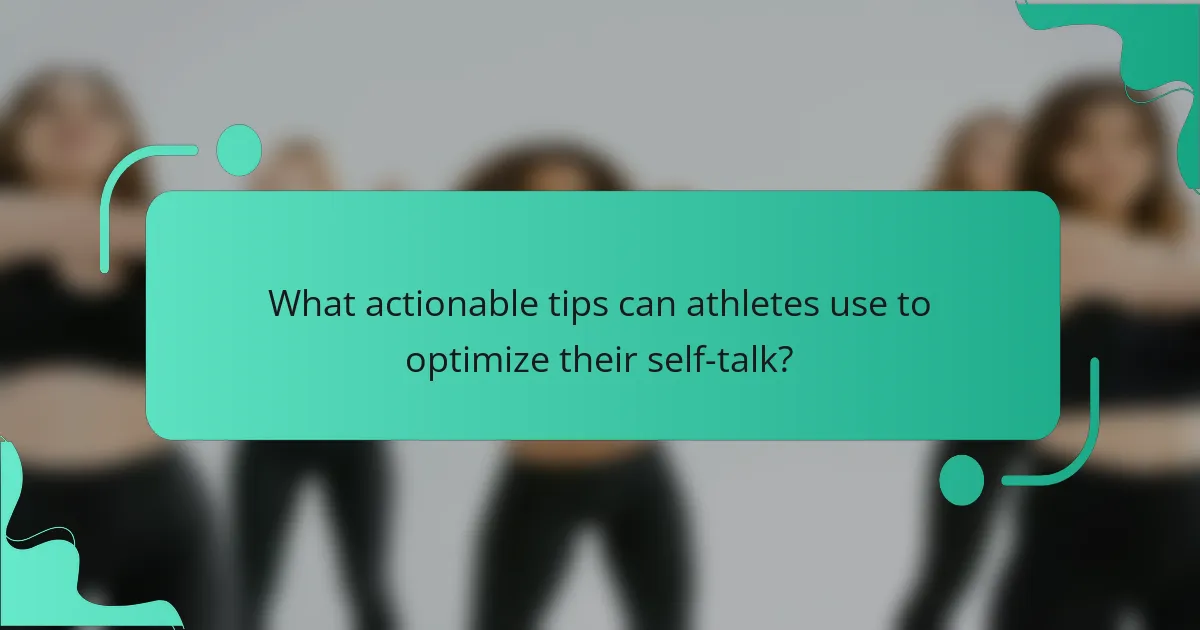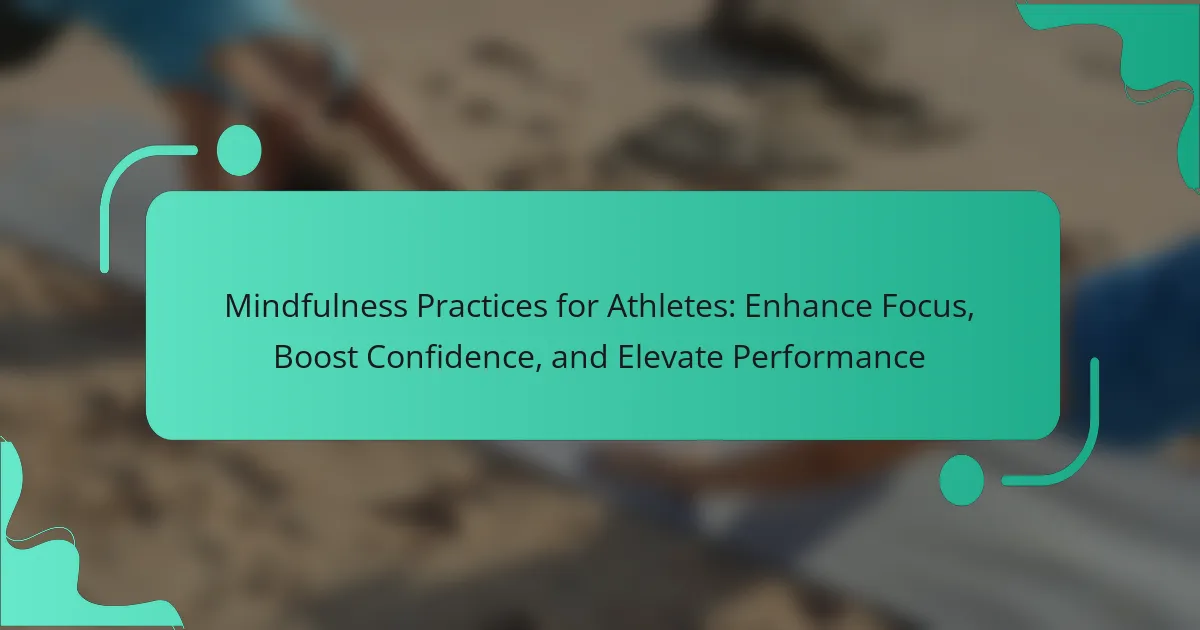Mindfulness practices for athletes enhance focus, boost confidence, and elevate performance. This article explores the benefits of self-talk, effective strategies for maintaining motivation, and common pitfalls to avoid. Techniques such as positive affirmations, visualization, and meditation can transform an athlete’s mental approach, leading to improved outcomes in competition. By integrating these practices, athletes can cultivate resilience and a positive mindset essential for peak performance.

How Does Self-Talk Impact Athletic Performance?
Self-talk significantly enhances athletic performance by improving focus and boosting confidence. Positive self-talk helps athletes manage stress and maintain motivation during competition. Research shows that athletes using constructive self-talk experience reduced anxiety and increased self-efficacy. This mental strategy fosters a growth mindset, enabling athletes to overcome challenges and perform at their best.
What are the key components of effective self-talk?
Effective self-talk for athletes involves positive affirmations, realistic goal-setting, and mindfulness techniques. These components enhance focus and build confidence. Positive affirmations reinforce self-belief, while realistic goals provide direction. Mindfulness techniques, such as breathing exercises, help maintain present-moment awareness, reducing anxiety and improving performance.
How can positive affirmations enhance self-talk?
Positive affirmations can significantly enhance self-talk by fostering a constructive mindset. They help athletes build confidence, reduce anxiety, and improve focus by reinforcing positive beliefs about their abilities. Regularly practicing affirmations can lead to a unique attribute of heightened resilience, allowing athletes to overcome challenges more effectively. As a result, this practice not only elevates performance but also cultivates a supportive internal dialogue essential for success in competitive environments.
What role does visualization play in self-talk?
Visualization significantly enhances self-talk by reinforcing positive mental imagery. This practice allows athletes to mentally rehearse their performance, leading to improved focus and confidence. By visualizing success, athletes can create a strong mental framework that supports their self-talk, making it more effective in high-pressure situations. Research indicates that athletes who regularly engage in visualization experience reduced anxiety and increased motivation, ultimately elevating their performance.
How does negative self-talk affect athletes?
Negative self-talk hinders athletes by diminishing confidence, focus, and performance. It creates a cycle of self-doubt that can lead to decreased motivation and increased anxiety. Mindfulness practices, such as meditation and positive affirmations, can counteract these effects. For example, athletes who engage in mindfulness report improved emotional regulation, which enhances their ability to focus during competitions. Studies show that mindfulness can reduce negative self-talk by up to 50%, promoting a more positive mindset.
What are common patterns of negative self-talk?
Negative self-talk often manifests in patterns such as self-criticism, catastrophizing, and overgeneralization. These patterns can undermine an athlete’s focus and confidence, hindering performance. For instance, self-criticism involves harsh judgments about one’s abilities, while catastrophizing anticipates the worst possible outcomes. Overgeneralization occurs when a single failure leads to a belief that one will always fail. Recognizing and addressing these patterns through mindfulness practices can enhance mental resilience and overall athletic performance.
How can athletes identify and challenge negative thoughts?
Athletes can identify and challenge negative thoughts through mindfulness practices. Techniques such as focused breathing and body scans help increase awareness of thoughts. By recognizing negative patterns, athletes can reframe their mindset. Journaling and cognitive restructuring allow for deeper analysis and transformation of these thoughts into positive affirmations. Regular practice enhances focus, boosts confidence, and improves overall performance.

What are the universal benefits of mindful self-talk for athletes?
Mindful self-talk enhances athletes’ performance by improving focus, boosting confidence, and promoting resilience. This practice cultivates a positive mindset, which is crucial during training and competition. Research indicates that athletes who engage in mindful self-talk experience reduced anxiety and improved concentration. Additionally, it fosters a greater sense of control over performance, leading to better outcomes in high-pressure situations. Embracing mindful self-talk can transform an athlete’s mental landscape, ultimately elevating their overall performance.
How does self-talk enhance focus during competitions?
Self-talk enhances focus during competitions by promoting a positive mindset and reducing anxiety. Athletes who use self-talk techniques can direct their attention to specific tasks, improving concentration. Research shows that self-talk can increase performance by 9% to 12% in competitive settings. This mental strategy allows athletes to maintain clarity and composure, ultimately elevating their performance levels.
In what ways can self-talk boost confidence levels?
Self-talk can significantly boost confidence levels by reinforcing positive beliefs and reducing anxiety. By consciously practicing affirmations, athletes can shift their mindset, enhancing focus and performance. Research shows that positive self-talk can lead to improved outcomes in competitive situations, helping athletes feel more prepared and capable. Additionally, self-talk serves as a mental rehearsal tool, allowing athletes to visualize success, which further solidifies their confidence.
How can self-talk improve emotional regulation in high-pressure situations?
Self-talk can significantly enhance emotional regulation in high-pressure situations by promoting positive thinking and reducing anxiety. Athletes who engage in constructive self-talk can maintain focus, boost confidence, and improve overall performance. Research indicates that self-talk helps in managing stress responses, allowing athletes to remain calm and composed during competitions. This practice cultivates a mindset that prioritizes resilience, enabling athletes to navigate challenges effectively.

What unique self-talk strategies do successful athletes use?
Successful athletes use unique self-talk strategies to enhance focus and boost confidence. They often employ positive affirmations, visualization techniques, and goal-setting phrases to maintain motivation and clarity. For instance, using specific affirmations like “I am strong and capable” reinforces self-belief. Additionally, visualizing successful performances helps athletes mentally prepare for competition. These strategies cultivate a positive mindset, which is critical for peak performance.
How do elite athletes tailor their self-talk for specific sports?
Elite athletes customize their self-talk to enhance performance by using sport-specific language and imagery. Tailored self-talk helps athletes maintain focus and build confidence during competition. For example, a sprinter may use phrases emphasizing speed and explosiveness, while a golfer might focus on calm and precision. Research indicates that effective self-talk can lead to improved performance metrics, such as reduced reaction times and increased accuracy. This approach exemplifies the unique attribute of mindfulness practices, where athletes leverage mental techniques to optimize their competitive edge.
What role do coaches play in shaping athletes’ self-talk?
Coaches significantly influence athletes’ self-talk by modeling positive dialogue and providing constructive feedback. This guidance helps athletes develop mindfulness practices that enhance focus and boost confidence. Coaches can teach techniques like visualization and affirmations, which promote a growth mindset. As a result, athletes learn to replace negative self-talk with empowering thoughts, improving overall performance.
How can athletes develop personalized self-talk scripts?
Athletes can develop personalized self-talk scripts by identifying specific performance goals and challenges. Start by writing down positive affirmations that resonate with personal experiences. Incorporate visualization techniques to enhance the effectiveness of these scripts. Regular practice during training sessions solidifies the mental framework, increasing focus and confidence during competitions. Tailor the scripts to reflect individual values and motivations for optimal impact.

What rare insights can be gained from the self-talk of world-class athletes?
World-class athletes gain rare insights from self-talk that enhance focus, boost confidence, and elevate performance. Their self-talk often emphasizes positive affirmations, goal visualization, and resilience. For example, elite athletes frequently use specific phrases that reinforce their capabilities, helping them maintain composure under pressure. Research shows that this form of mindfulness practice can improve mental clarity and reduce anxiety, contributing to superior performance outcomes. These insights can be applied by other athletes to develop their own effective self-talk strategies.
What unconventional self-talk techniques have proven effective?
Mindfulness practices for athletes can include unconventional self-talk techniques such as visualization, affirmations, and reframing negative thoughts. Visualization involves imagining successful performances, which enhances focus and confidence. Affirmations are positive statements that reinforce self-belief, helping athletes maintain motivation. Reframing negative thoughts allows athletes to shift their mindset, turning potential setbacks into growth opportunities. These techniques can lead to improved performance and mental resilience.
How can cultural background influence self-talk practices?
Cultural background significantly influences self-talk practices by shaping beliefs and attitudes. Different cultures promote distinct values that affect how athletes perceive their abilities and challenges. For example, collectivist cultures may emphasize team success, leading to supportive self-talk, while individualistic cultures might focus on personal achievement, fostering competitive self-talk. These variations can impact an athlete’s focus and confidence levels during performance. Understanding these cultural nuances allows athletes to tailor their self-talk strategies, enhancing mindfulness practices and overall performance.

How can athletes implement mindfulness practices to enhance self-talk?
Athletes can enhance self-talk through mindfulness practices by incorporating techniques like meditation, breathing exercises, and visualization. These methods cultivate awareness and promote positive internal dialogue. Regular meditation can reduce negative self-talk, while focused breathing helps maintain calmness during competition. Visualization techniques allow athletes to mentally rehearse success, boosting confidence and performance. By consistently practicing mindfulness, athletes can shift their mindset, fostering resilience and a positive outlook.
What are the best mindfulness exercises for improving self-talk?
Mindfulness exercises that improve self-talk include focused breathing, body scans, and positive affirmations. These practices enhance self-awareness and foster a supportive inner dialogue. Focused breathing helps calm the mind, while body scans promote relaxation and awareness of physical sensations. Positive affirmations reinforce confidence and self-acceptance. Each technique contributes uniquely to improving mental resilience and performance in athletes.
How can athletes create a daily routine for mindful self-talk?
Athletes can create a daily routine for mindful self-talk by incorporating specific strategies. Begin each day with a positive affirmation to set a constructive tone. Schedule short mindfulness breaks throughout training sessions to focus on breathing and self-encouragement. Use visualization techniques before competitions to reinforce confidence and mental clarity. Regularly reflect on performance and self-talk patterns to identify areas for improvement. Finally, maintain a journal to track progress and reinforce positive self-dialogue consistently.

What common mistakes do athletes make in their self-talk practices?
Athletes often make several common mistakes in their self-talk practices. These include using negative language, lacking specificity in their affirmations, and failing to practice consistently. Negative self-talk can undermine confidence and focus. Vague affirmations do not provide clear guidance, while inconsistency hinders the development of a positive mindset. Addressing these mistakes can significantly enhance mindfulness practices and overall performance.
How can athletes avoid the pitfalls of overthinking?
Athletes can avoid overthinking by practicing mindfulness techniques. These techniques enhance focus, boost confidence, and elevate performance. Mindfulness helps athletes stay present, reducing anxiety and distractions. Techniques such as deep breathing, body scans, and visualization can empower athletes to maintain clarity during competition. Regular practice leads to improved mental resilience, allowing athletes to respond effectively under pressure.
What are the signs of ineffective self-talk that athletes should be aware of?
Ineffective self-talk in athletes often manifests as negative thoughts, self-doubt, or unrealistic expectations. Recognizing these signs is crucial for improving mental resilience. Common indicators include frequent self-criticism, focusing on past mistakes, or comparing oneself unfavorably to others. Additionally, excessive worry about performance or outcomes can hinder focus and confidence. Addressing these patterns through mindfulness practices can enhance overall performance.

What actionable tips can athletes use to optimize their self-talk?
Athletes can enhance their self-talk by practicing positive affirmations, visualizing success, and maintaining a growth mindset. These techniques foster resilience and focus. For example, using specific affirmations like “I am strong and capable” can reinforce confidence. Visualization helps in mentally preparing for performance, while a growth mindset encourages learning from mistakes. Regularly integrating these practices into training can lead to improved performance outcomes.
How can athletes measure the effectiveness of their self-talk?
Athletes can measure the effectiveness of their self-talk by tracking performance metrics and emotional responses. Regularly assessing focus, confidence levels, and stress management can reveal the impact of self-talk strategies. For instance, maintaining a journal to record thoughts before and after competitions can provide insights into patterns that enhance or hinder performance. Additionally, using visualization techniques alongside self-talk can help athletes gauge their mental readiness and overall effectiveness.
What expert insights can enhance self-talk strategies for athletes?
Expert insights can significantly enhance self-talk strategies for athletes by integrating mindfulness practices. Mindfulness helps athletes maintain focus, boost confidence, and elevate performance. Techniques such as visualization and positive affirmations can reshape negative self-talk into constructive dialogues. Research indicates that athletes employing mindfulness report improved emotional regulation and reduced anxiety, leading to better performance outcomes. Incorporating regular mindfulness meditation sessions can further solidify these benefits, fostering a resilient mindset essential for competitive success.
